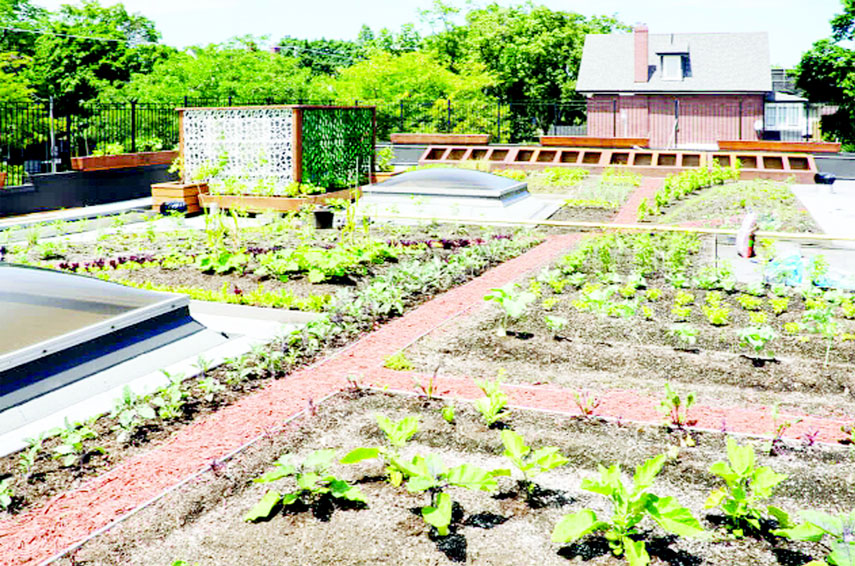Importance of rooftop gardening in reducing the city temperature

Z A M Khairuzzaman :
Indiscriminate urbanisation has created serious environmental problems across the world. Above all, global warming has turned critical. Between 1880 and 2018, the temperature of the Earth’s surface increased by around 0.9 degree C. The resulting rise in global sea levels and the destruction of ecosystems that are unable to withstand these rising temperatures will have a major impact on the everyday life of billions of people. By the end of this century, the average temperature on Earth could rise by anything between 1.1 degree C to 6.4 degree C, according to an intergovernmental panel on climate change. And the global average sea-level rise is forecast to be somewhere between 0.4m and 0.77m, with every 0.1m rise in global sea level directly affecting up to 10 million people.
The impacts on Bangladesh are particularly severe due to its low-lying geography and dense population. It is feared that the average temperature is likely to rise by anything between 1 degree C to 2.5 degree C in this South Asian country, according to climate scientists. And the global average sea-level rise is forecast to be somewhere between 0.26 m and 0.98 m, with every 0.1 m rise in sea level directly affecting up to one million people.
By addressing the rising city temperature and the challenges posed by climate change, rooftop gardening is a sustainable solution for creating a cooler, healthier, and more livable city. The capital city of Dhaka experiences the “Urban Heat Island” (UHI) effect, where the city areas are significantly warmer than surrounding rural areas due to heat-absorbing surfaces like concrete and asphalt. Rooftop gardens help reduce this effect by providing vegetation that cools the surrounding air through shading and transpiration.
Plants in rooftop gardens release water vapour into the atmosphere, a process called evapotranspiration. This natural cooling mechanism lowers ambient temperatures, especially during hot weather. Rooftop gardens act as an insulating layer, reducing heat absorption by buildings. This not only cools the building, but also minimises the release of heat back into the environment.
Vegetation on rooftops absorbs carbon dioxide and produces oxygen, contributing to improved air quality and reducing the greenhouse gases that exacerbate global warming. By cooling buildings naturally, rooftop gardens decrease the need for air conditioning, thereby lowering energy consumption. This helps reduce heat emissions and decreases the city temperature indirectly.
The neighbourhoods of the capital city lack sufficient greenery. Rooftop gardens make use of otherwise unutilised spaces to add vegetation, contributing to overall cooling and enhancing biodiversity. Rooftop gardens often replace dark, heat-absorbing roofs with vegetation that absorbs less heat and reflects more sunlight, reducing surface temperatures.
Besides mitigating the urban heat island effect, rooftop gardening also offers other environmental benefits. Plants act as natural air filters. They absorb carbon dioxide (CO2), release oxygen (O2), and capture particulate matter (PM2.5 and PM10) that contributes to air pollution. Vegetated rooftops reduce surface and air temperatures. Cooler temperatures mean less need for air conditioning, which reduces emissions from electricity production.
Plants, especially those with large leaves, trap dust, smoke, and airborne pollutants like nitrogen oxides (NOx) and sulfur dioxide (SO2). Rooftop gardens contribute to better air circulation and humidity levels, improving overall air quality. Plants on rooftops absorb CO2 from the atmosphere, helping to mitigate its concentration in city air.
By encouraging rooftop gardening in Dhaka, the city can also address its pressing issue of air quality while creating greener, more livable spaces. In reality, roof gardens provide three types of benefits environmentally, socially, and economically.
In the meantime, green roofs in Dhaka are gaining attention as a sustainable solution to combat urban environmental challenges such as heat islands, air pollution and other issues. Given Dhaka’s rapid urbanisation and limited green spaces, rooftop gardening and green roofing systems are being explored to improve air quality and reduce building temperatures.
Approximately, the city boasts over 30,000 rooftop gardens, accounting for more than 7% of its buildings. These green rooftops not only enhance the aesthetic appeal, but also contribute to environmental conservation and other issues.
Meanwhile, speakers at a seminar titled ‘Importance of Rooftop Gardening in Mitigating Global Warming’ held recently in the capital underscored the need for setting up rooftop gardens all over in greater numbers in the coming days. Organised by the Jatiya Press Club (JPC) managing committee, in collaboration with ‘Dhakar Shekor,’ the event was graced by Syeda Rizwana Hasan, Adviser to Environment, Forestry, Climate Change, and Water Resources, as the Chief Guest. She assured all-out assistance of the Interim Government in combating the vexing issue of Global Warming. While addressing as a special guest, Mostafa Kamal Mojumder of ‘Greenway Dhaka’ stressed on promoting rooftop gardening for our very survival.
Another special guest, Ayub Bhuiyan, also the JPC General Secretary, declared his intention to set up a rooftop garden at the national press club, which was highly applauded by the audience. Later, saplings were distributed among the interested persons for planting those at their rooftop gardens. Heartfelt thanks to the organisers for organising such a grand event!
(The writer is a senior journalist as well as columnist, who gives priority to environmental and climate change-related issues. E-mail: [email protected])
